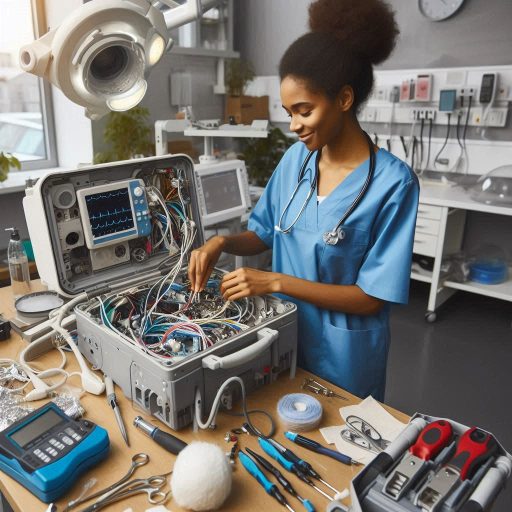Introduction
Overview of the Impact of COVID-19 on Various Industries
The COVID-19 pandemic has significantly disrupted industries across the globe, triggering widespread changes and challenges.
Many sectors faced severe economic strain, with businesses closing or shifting to remote operations.
The healthcare industry, in particular, saw immense pressure as hospitals and clinics scrambled to handle the influx of patients and manage limited resources.
This period revealed both the vulnerabilities and the resilience of various industries, accelerating shifts toward digital solutions and new operational practices.
The Impact on Biomedical Technician Careers
This blog post will specifically explore the impact of COVID-19 on biomedical technician careers.
Biomedical technicians, essential for maintaining and repairing critical medical equipment, encountered increased demands and new responsibilities during the pandemic.
Their roles became more pivotal as healthcare systems relied heavily on their expertise to ensure the continuous functionality of medical devices.
We will examine how the pandemic has reshaped their work, the challenges faced, and the evolving skills needed.
This focus will highlight the significant changes and opportunities within this vital field.
Increased Demand for Biomedical Technicians during the Pandemic
Hospitals and Healthcare Facilities Relying More on Medical Equipment
The COVID-19 pandemic drastically increased the reliance on medical equipment across hospitals and healthcare facilities.
As the number of patients surged, the use of advanced medical devices became essential.
Hospitals found themselves in urgent need of ventilators, infusion pumps, and diagnostic machines.
These devices played a critical role in managing severe cases and supporting patient care.
The overwhelming influx of patients meant that hospitals had to depend more on their medical equipment than ever before.
This dependence highlighted the need for reliable, high-functioning devices to handle the increased workload and ensure effective treatment.
Biomedical Technicians Needed to Maintain, Repair, and Calibrate Equipment
In response to the heightened demand for medical equipment, biomedical technicians became crucial.
Their role in maintaining, repairing, and calibrating equipment became more important than ever.
The pandemic revealed how essential these professionals are in ensuring that medical devices operate efficiently.
Technicians faced an unprecedented volume of work as equipment use surged.
They were responsible for performing routine maintenance, addressing unexpected repairs, and calibrating devices to ensure they met safety and performance standards.
Biomedical technicians worked long hours to keep up with the demands placed on them.
Their responsibilities included frequent equipment checks, timely repairs, and precise calibrations.
The urgency of their tasks was heightened by the need for continuous, reliable operation of life-saving equipment.
The pandemic underscored the vital role of biomedical technicians in the healthcare system, demonstrating their indispensable contribution to patient care and hospital operations.
The increased focus on medical equipment during the pandemic highlighted the importance of a skilled biomedical technician workforce.
Facilities recognized the need for more trained professionals to manage the complex demands of medical devices.
As a result, there was a surge in job opportunities and a push to expand training programs.
Biomedical technicians adapted to the challenging environment, showcasing their expertise and resilience.
Their efforts ensured that hospitals could rely on their equipment to deliver the best possible care to patients during a time of immense strain.
Read: Networking Tips for Surveying and Mapping Professionals
Challenges Faced by Biomedical Technicians During COVID-19
Limited Access to Hospitals and Healthcare Facilities for Maintenance and Repair Work
During the COVID-19 pandemic, biomedical technicians encountered significant challenges, starting with restricted access to hospitals and healthcare facilities.
With heightened infection control measures, many facilities implemented strict access protocols.
Technicians faced barriers to entering hospitals, which complicated routine maintenance and emergency repairs.
Limited access created delays in addressing equipment issues and increased the risk of device malfunctions.
This restricted movement made it challenging for technicians to perform essential tasks, impacting the overall efficiency of medical equipment management.
Increased Workload Due to High Demand for Equipment Servicing
The surge in medical equipment use during the pandemic led to an overwhelming increase in workload for biomedical technicians.
As hospitals expanded their use of devices like ventilators and infusion pumps, the demand for servicing these pieces of equipment soared.
Technicians were inundated with requests for maintenance, repairs, and calibrations.
Their workload intensified as they worked to ensure that every device functioned optimally amidst the high-pressure environment.
The increased volume of work stretched resources and required technicians to manage time and prioritize tasks more efficiently.
Safety Concerns and Risk of Exposure to the Virus While Working on Medical Equipment
Safety concerns and the risk of virus exposure posed another major challenge for biomedical technicians.
Working in healthcare settings during the pandemic meant encountering a heightened risk of contracting COVID-19.
Technicians had to navigate environments with stringent infection control measures while handling equipment used by infected patients.
This exposure risk added to their stress and required additional precautions.
Personal protective equipment (PPE) became essential, but it also posed its own set of challenges, such as limited availability and discomfort.
Ensuring their own safety while maintaining equipment became a delicate balance that technicians had to manage.
In summary, biomedical technicians faced considerable challenges during the COVID-19 pandemic.
Limited access to facilities, increased workload, and safety concerns were significant obstacles.
Despite these difficulties, technicians remained crucial in ensuring the functionality and reliability of medical equipment, demonstrating their resilience and dedication under trying circumstances.
Read: Field vs. Office Work in Surveying and Mapping
Changes in the Job Responsibilities of Biomedical Technicians
Adapting to New Protocols and Safety Measures in the Workplace
The COVID-19 pandemic significantly altered the job responsibilities of biomedical technicians, starting with the need to adapt to new protocols and safety measures.
Technicians had to become familiar with stringent infection control guidelines to prevent virus transmission.
This included wearing personal protective equipment (PPE), following enhanced cleaning procedures, and adhering to social distancing protocols when possible.
Their daily routines changed as they integrated these measures into their maintenance and repair work.
Adapting to these protocols was crucial for safeguarding both technicians and healthcare staff, ensuring that medical equipment could be serviced safely and effectively.
Incorporating Telehealth and Remote Monitoring Technologies into Their Work
Another significant change in the responsibilities of biomedical technicians was the incorporation of telehealth and remote monitoring technologies.
With the rise of telehealth, there was a growing need for technicians to support and maintain remote monitoring systems.
These technologies allowed healthcare providers to track patient conditions from a distance, reducing the need for in-person visits.
Technicians had to become proficient in troubleshooting and maintaining these new systems, ensuring they functioned correctly and integrated seamlessly with existing medical equipment.
This shift expanded their role, requiring them to adapt to emerging technologies and support a broader range of healthcare solutions.
Collaborating with Other Healthcare Professionals to Ensure the Safe and Effective Use of Medical Devices
Collaboration with other healthcare professionals became more prominent in the role of biomedical technicians during the pandemic.
Technicians worked closely with doctors, nurses, and other staff to ensure the safe and effective use of medical devices.
This collaboration involved coordinating maintenance schedules, addressing equipment-related issues promptly, and providing training on new devices or procedures.
Effective communication with healthcare teams was essential for ensuring that medical equipment was used correctly and efficiently.
By working together, biomedical technicians and healthcare professionals could enhance patient care and address challenges arising from the increased reliance on complex medical devices.
In summary, the COVID-19 pandemic brought significant changes to the job responsibilities of biomedical technicians.
They adapted to new safety protocols, incorporated remote technologies into their work, and collaborated more closely with healthcare professionals.
These changes reflected the evolving demands of the healthcare environment and underscored the technicians‘ critical role in supporting effective patient care.
Read: Importance of Accuracy in Surveying and Mapping

Discover More: Effective Communication for Field Service Technicians
Discover More: Future Outlook for Computer Engineering Careers
Impact on Training and Education for Aspiring Biomedical Technicians
Disruption of In-Person Classes and Hands-On Training Programs
The COVID-19 pandemic caused significant disruptions to training and education for aspiring biomedical technicians.
In-person classes and hands-on training programs were halted or severely restricted due to health and safety concerns.
Educational institutions faced challenges in conducting practical sessions, which are crucial for developing the technical skills needed in the field.
This disruption affected the quality and continuity of training, as students were unable to engage directly with equipment and receive real-time feedback from instructors.
Shift Towards Online Learning and Virtual Simulations for Practical Experience
In response to the disruptions, there was a rapid shift towards online learning and virtual simulations.
Educational programs adapted by offering theoretical coursework and virtual simulations to replicate hands-on training.
Online platforms provided students with access to lectures, interactive modules, and digital resources.
Virtual simulations allowed aspiring technicians to practice troubleshooting and equipment management in a simulated environment.
While these methods offered some level of practical experience, they could not entirely replace the hands-on experience gained from working directly with real medical devices.
Challenges in Gaining Clinical Experience and Exposure to Actual Medical Devices
One of the major challenges for aspiring biomedical technicians during the pandemic was gaining clinical experience and exposure to actual medical devices.
With restrictions on access to healthcare facilities, students faced difficulties in securing internships or clinical placements.
Direct interaction with medical devices and real-world scenarios became limited, impacting their ability to develop practical skills.
This lack of exposure hindered their readiness for professional roles and delayed their entry into the workforce.
Institutions and students had to find alternative ways to bridge this gap, but the absence of traditional clinical experience remained a significant hurdle.
In summary, the COVID-19 pandemic had a profound impact on the training and education of aspiring biomedical technicians.
Disruptions to in-person classes and hands-on training, along with a shift towards online learning and virtual simulations, changed the educational landscape.
The challenges in gaining clinical experience and exposure to actual medical devices highlighted the difficulties faced by students in preparing for careers in this essential field.
Read: Surveying and Mapping Technician: Job Satisfaction
Job Market Outlook for Biomedical Technicians Post-Pandemic
Potential Increase in Demand for Technicians with Expertise in Medical Equipment Maintenance and Repair
Post-pandemic, the job market for biomedical technicians is poised for growth, driven by an increased demand for expertise in medical equipment maintenance and repair.
The COVID-19 crisis highlighted the crucial role of biomedical technicians in ensuring that medical devices function reliably.
As healthcare systems continue to invest in advanced technologies, the need for skilled technicians to maintain and repair this equipment is expected to rise.
Hospitals and healthcare facilities will likely seek professionals who can manage the complexity and volume of modern medical devices, creating robust job opportunities in the field.
Transform Your Career Today
Unlock a personalized career strategy that drives real results. Get tailored advice and a roadmap designed just for you.
Start NowShift Towards Telehealth and Remote Monitoring Technologies May Shape the Future of the Profession
The shift towards telehealth and remote monitoring technologies is expected to significantly influence the future of the biomedical technician profession.
The pandemic accelerated the adoption of these technologies, changing how healthcare is delivered and monitored.
Biomedical technicians will need to adapt by acquiring skills in supporting and troubleshooting remote monitoring systems and telehealth platforms.
This evolution may open new avenues within the profession, as technicians become integral in maintaining and optimizing these digital healthcare solutions.
Embracing this shift will be essential for technicians aiming to stay relevant and advance their careers.
Opportunity for Growth and Advancement in the Field of Biomedical Engineering
The post-pandemic era presents substantial opportunities for growth and advancement in the field of biomedical engineering.
As healthcare technology continues to advance, there will be an increasing demand for biomedical engineers and technicians who can innovate and improve medical devices.
Professionals with a strong background in biomedical engineering will find opportunities to lead in research and development, contribute to cutting-edge technologies, and drive improvements in patient care.
The expansion of the field offers promising career paths for those seeking to advance their expertise and take on leadership roles within the healthcare technology sector.
In summary, the job market for biomedical technicians post-pandemic is expected to grow, driven by a heightened need for equipment maintenance and repair expertise.
The ongoing shift towards telehealth and remote monitoring will shape the profession’s future, requiring technicians to adapt to new technologies.
Additionally, there are significant opportunities for career advancement within biomedical engineering, as the field evolves with advancements in healthcare technology.
Uncover the Details: Common Challenges Faced by Computer Engineers
Conclusion
The Impact of COVID-19 on Biomedical Technician Careers
The COVID-19 pandemic had a profound impact on biomedical technician careers.
Technicians experienced increased workloads and urgent demands as healthcare systems were stretched to their limits.
Their role evolved rapidly to address new challenges, such as maintaining and troubleshooting critical equipment under pressure.
This period underscored the essential role of biomedical technicians in healthcare.
Importance of Adapting to Changing Circumstances and Embracing New Technologies in the Field
Adapting to these changes proved crucial.
Technicians embraced new technologies and underwent advanced training to keep up with evolving medical equipment and protocols.
This adaptability not only helped manage the immediate crisis but also prepared them for future challenges.
Staying abreast of technological advancements became a key factor in maintaining efficiency and effectiveness.
Encouragement for Aspiring Technicians to Stay Informed and Prepared for Future Challenges and Opportunities
Aspiring biomedical technicians should actively seek knowledge and stay informed about industry trends.
The pandemic highlighted the importance of being adaptable and proactive.
By preparing for future challenges and embracing ongoing learning, technicians can seize new opportunities and thrive in a rapidly evolving field.
[E-Books for Sale]
The Big Book of 500 High-Paying Jobs in America: Unlock Your Earning Potential
$19.99 • 500 High-Paying Jobs • 330 pages
Explore 500 high-paying jobs in America and learn how to boost your career, earn more, and achieve success!
See All 500 High-Paying Jobs of this E-Book
1001 Professions Without a Degree: High-Paying American Jobs You Can Start Now
$19.99 • 1001 Professions Without a Degree • 174 pages
Discover 1001 high-paying jobs without a degree! Unlock career tips, skills, and success strategies for just $19.99!




